Last Updated on March 12, 2025 by Karen
Savor the flavor of juicy turkey burgers topped with caramelized onions, crumbled blue cheese, and garlic aioli. This healthy burger recipe is a simple way to elevate frozen turkey burgers into a gourmet meal!
Grilling season is here, and there’s no better time to enjoy a delicious homemade burger! While traditional beef burgers are popular, turkey burgers offer a healthier alternative that’s just as satisfying. And if you’re short on time, frozen turkey burgers are an easy way to make a quick and delicious meal. By adding a few gourmet touches like caramelized onions, blue cheese, and garlic aioli, you can easily elevate frozen turkey burgers into a flavorful and impressive meal. Whether you’re hosting a summer BBQ or making a weeknight dinner, this simple recipe is sure to impress your guests and family.
Why Doctoring Up Frozen Turkey Burgers Works So Well
Frozen turkey burgers are convenient and quick, but they can sometimes be a little bland on their own. The great thing is, it’s easy to doctor up frozen turkey burgers by adding a few ingredients to enhance the flavor and make them feel more gourmet. By topping them with caramelized onions, blue cheese, and garlic aioli, you can take a simple frozen turkey patty and turn it into a mouthwatering burger that’s bursting with flavor.
Ingredients for Caramelized Onion and Blue Cheese Turkey Burgers
To make these delicious gourmet turkey burgers, you’ll need the following ingredients:
Garlic cloves: Minced garlic provides a bold, aromatic flavor that forms the base of the aioli. If you prefer a milder flavor, roasted garlic can be used instead. Roasting garlic softens its pungency, creating a sweet, subtle taste that still adds depth to the aioli. Alternatively, garlic powder can be used for a different flavor profile, though it won’t have the same fresh, aromatic kick as fresh garlic.
Mayonnaise: Mayonnaise acts as the creamy base of the aioli, adding richness and smooth texture. For a lighter version, you can substitute mayonnaise with Greek yogurt or sour cream, both of which offer a tangy creaminess with fewer calories. For a dairy-free option, vegan mayonnaise works well without compromising texture or flavor.
Olive oil: Olive oil helps to thin the aioli slightly, making it easier to spread, while contributing a mild fruity flavor. If you prefer a richer flavor, avocado oil can replace olive oil, providing a buttery note. For a more indulgent twist, truffle oil can be used to add an earthy, luxurious flavor to the aioli.
Fresh lemon juice: Fresh lemon juice adds a refreshing tang that balances the richness of the mayo and olive oil. If you’re out of lemons, vinegar (apple cider or white wine vinegar) can serve as a substitute.
Salt and pepper: Salt and pepper season the aioli to taste, bringing out the natural flavors of the garlic. Feel free to adjust the seasoning based on your preferences. For added heat, a pinch of cayenne pepper or smoked paprika can provide a subtle kick. Fresh herbs, such as parsley or dill, can also be added for extra flavor.
Unsalted butter: Unsalted butter is used to sauté the onions, helping them caramelize perfectly and adding a rich, smooth flavor. If you’re looking for a healthier alternative, olive oil or coconut oil can be used. Coconut oil will introduce a hint of sweetness and a subtle tropical flavor.
Yellow onion: Yellow onions have a natural sweetness that deepens when caramelized, adding a savory and rich flavor to the turkey burger. For a milder or different flavor, sweet onions (like Vidalia) can be used, which are even sweeter and less pungent. Red onions also work well but may not caramelize as sweetly and offer a slightly sharper flavor.
Frozen turkey burgers: Frozen turkey burgers are a convenient, lean protein option that requires minimal prep. I like to use Jennie-O All White Turkey Burgers or Trader Joe’s Caramelized Onion & Bell Pepper Turkey Patties for this recipe. If you prefer a different protein, chicken burgers or veggie patties can be substituted. Beef patties also pair wonderfully with the toppings, offering a richer alternative for those looking for a more indulgent burger.
Hamburger buns: Hamburger buns serve as the perfect base for these gourmet turkey burgers. To make the meal healthier, you can swap out regular buns for whole-grain buns, which add fiber and nutrients. For a low-carb or gluten-free alternative, consider using lettuce wraps instead of buns for a fresh, crisp bite.
Baby arugula leaves: Arugula adds a peppery, slightly bitter bite that contrasts beautifully with the richness of the turkey and the creaminess of the aioli. If you’re not a fan of arugula, baby spinach, kale, or mixed greens are great substitutes. For a more vibrant and sweet option, fresh basil or cilantro can be used, or for extra crunch, shredded iceberg lettuce can be added.
Blue cheese: Blue cheese brings a bold, tangy flavor that complements the savory turkey burger. If blue cheese is too strong for your taste, other cheeses like goat cheese, feta, or sharp cheddar will work well. For a milder cheese option, mozzarella or Havarti can be used, offering a creamy texture without the pungency of blue cheese.
How to Make Caramelized Onion and Blue Cheese Turkey Burgers
Step 1: Prepare the Garlic Aioli
In a small bowl, mix together the minced garlic, mayonnaise, olive oil, and fresh lemon juice. Season with salt and pepper to taste. Set the garlic aioli aside while you prepare the turkey burgers.
Step 2: Caramelize the Onions
In a large skillet, melt the unsalted butter over medium-high heat. Add the sliced onions and cook, stirring occasionally, for 15 to 20 minutes, or until the onions are softened and golden brown. If necessary, you can cook the onions for up to 30 to 40 minutes to achieve perfect caramelization. Season with salt and pepper to taste.
Step 3: Cook the Frozen Turkey Burgers
Cook frozen turkey burger patties according to package instructions. See more below on different preparation methods. Be sure to check that the internal temperature of the turkey burgers reaches 165°F for safe consumption.
Step 4: Assemble the Burgers
Spread a generous layer of garlic aioli on the bottom half of each hamburger bun. Add a few fresh baby arugula leaves for a peppery crunch, then place the cooked turkey burger on top. Finish by topping with the caramelized onions and crumbled blue cheese. Top with the other half of the bun and serve immediately!
What is the Method for Quick Caramelized Onions?
To quickly caramelize onions, start by thinly slicing your onions. Heat 1-2 tablespoons of olive oil or butter in a large skillet over medium heat. Add the sliced onions and cook for about 5-7 minutes, stirring occasionally, until they begin to soften and become translucent. To speed up the caramelization process, sprinkle a pinch of salt and about 1/2 teaspoon of sugar (optional) over the onions. The salt helps draw out moisture, and the sugar accelerates the caramelization, giving the onions a sweeter flavor. Lower the heat to medium-low and continue cooking the onions for another 5-10 minutes, stirring occasionally, until they turn golden brown and sweet. If they start sticking to the pan, add a splash of water or broth to deglaze. Once the onions are perfectly caramelized, remove them from the pan and serve them on your favorite dish, like burgers or salads. This quick method lets you enjoy delicious, caramelized onions in under 20 minutes!
How to Tell if a Turkey Burger is Done?
To tell if a turkey burger is done, the most reliable method is to check its internal temperature. Turkey burgers should be cooked to an internal temperature of 165°F (74°C). You can use a meat thermometer to check the temperature in the thickest part of the patty, ensuring it has reached the proper temperature for safety and optimal juiciness.
In addition to using a thermometer, you can check for a few visual cues:
Juices: When you press on the burger with a spatula, the juices should run clear rather than pink or red. If the juices are still pink, the burger likely needs more cooking time.
Texture: A cooked turkey burger should feel firm and not too squishy when pressed. If it feels mushy or soft, it’s not yet fully cooked.
Color: The exterior of the burger should be golden brown and slightly crispy. If the inside is still pink, it requires more time on the grill or in the pan.
To ensure perfectly cooked turkey burgers, it’s always best to use a thermometer for accuracy.
Is Turkey Burger Healthy?
Turkey burgers can be a healthy option, especially compared to traditional beef burgers. Here are some reasons why turkey burgers can be considered a healthier choice:
1. Lower in Fat
Turkey, particularly lean ground turkey, is lower in fat than regular beef. It contains less saturated fat, which is linked to heart disease and high cholesterol levels. If you choose lean turkey (like 93% lean), it’s a great source of protein without the extra fat found in higher-fat beef cuts.
2. High in Protein
Turkey is a great source of high-quality protein, which is essential for muscle growth, tissue repair, and overall body function. Protein also helps you feel full for longer periods, making it a good choice for weight management.
3. Nutrient-Rich
Turkey burgers are packed with essential nutrients like B vitamins (particularly niacin, vitamin B6, and B12), zinc, and selenium. These nutrients are important for energy production, immune health, and maintaining healthy skin, hair, and nails.
4. Lower in Calories
A turkey burger typically has fewer calories than a beef burger, especially if made with lean ground turkey. This makes it a good choice for those looking to manage their calorie intake while still enjoying a satisfying meal.
5. Versatile and Easy to Customize
Turkey burgers are highly versatile and can be customized with healthy toppings like fresh vegetables (e.g., lettuce, tomatoes, onions), low-fat cheeses, and whole-grain buns. By using healthier ingredients and controlling the amount of added fat and salt, you can make a turkey burger a balanced, nutrient-packed meal.
Overall, turkey burgers can be a nutritious, flavorful, and healthy alternative to traditional beef burgers, especially when prepared with lean turkey and served with wholesome toppings and sides.
What to Serve with These Turkey Burgers?
To complement the rich flavors of the Caramelized Onion and Blue Cheese Turkey Burgers, consider serving sides that balance the savory, creamy elements of the burger while offering fresh or crispy textures. Crispy sweet potato fries are a perfect choice, adding a subtle sweetness that pairs beautifully with the caramelized onions and tangy blue cheese. For a lighter option, grilled vegetables like zucchini, bell peppers, or asparagus bring smoky flavors and freshness, enhancing the overall meal without overpowering the burger.
A refreshing coleslaw, made with a vinaigrette dressing, offers a crunchy, tangy contrast to the richness of the burger, while a side of roasted Brussels sprouts provides a hearty, slightly bitter note that complements the creamy blue cheese. If you’re looking for something lighter, a mixed green salad with fresh herbs, cucumber, and avocado will add brightness and a crisp texture that balances the burger’s bold toppings.
For a more indulgent side, crispy potato wedges seasoned with your favorite spices are a satisfying choice that pairs wonderfully with the turkey burgers. Finally, a side of pickles—whether dill or bread-and-butter—adds a tangy, crunchy bite, providing a refreshing palate cleanser between bites of the rich burger. These sides all offer a variety of textures and flavors that will enhance your burger experience and make for a well-rounded, delicious meal.
Caramelized Onions and Blue Cheese Turkey Burgers
Ingredients
For the garlic aioli:
- 2 garlic cloves minced
- 1/2 cup mayonnaise
- 2 tbsps olive oil
- 1 tbsp fresh lemon juice
- Salt and pepper to taste
For the burgers:
- 1/2 tbsp unsalted butter
- 1 small yellow onion sliced
- 4 frozen turkey hamburger patties
- 4 hamburger buns split
- Baby arugula leaves for serving
- 2 oz blue cheese crumbled
Instructions
- Mix garlic, mayonnaise, olive oil, and lemon juice in a small bowl. Season with salt and pepper to taste.
- In a large skillet on medium high heat, melt butter and cook onions until softened and caramelized, stirring occasionally, about 15 to 20 minutes. Season with salt and pepper to taste.
- Prepare frozen turkey burger patties according to package instructions.
- Spread garlic aioli on the bottom of hamburger bun. Add arugula and cooked turkey burger then topped with caramelized onions and blue cheese. Enjoy!
Notes
With just a few simple ingredients, you can easily transform frozen turkey burgers into a delicious, gourmet meal. The combination of caramelized onions, blue cheese, and garlic aioli gives these burgers a rich, savory flavor that takes them to the next level. They’re easy to make, healthy, and perfect for any grilling occasion!

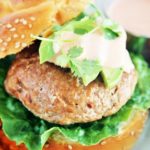
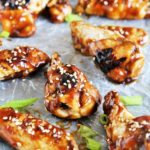
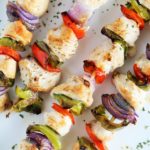
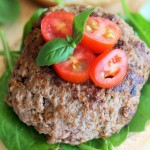
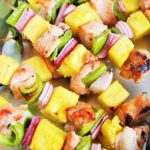










Looks delicious! I’m a big fan of the caramelized onions and blue cheese combo :)